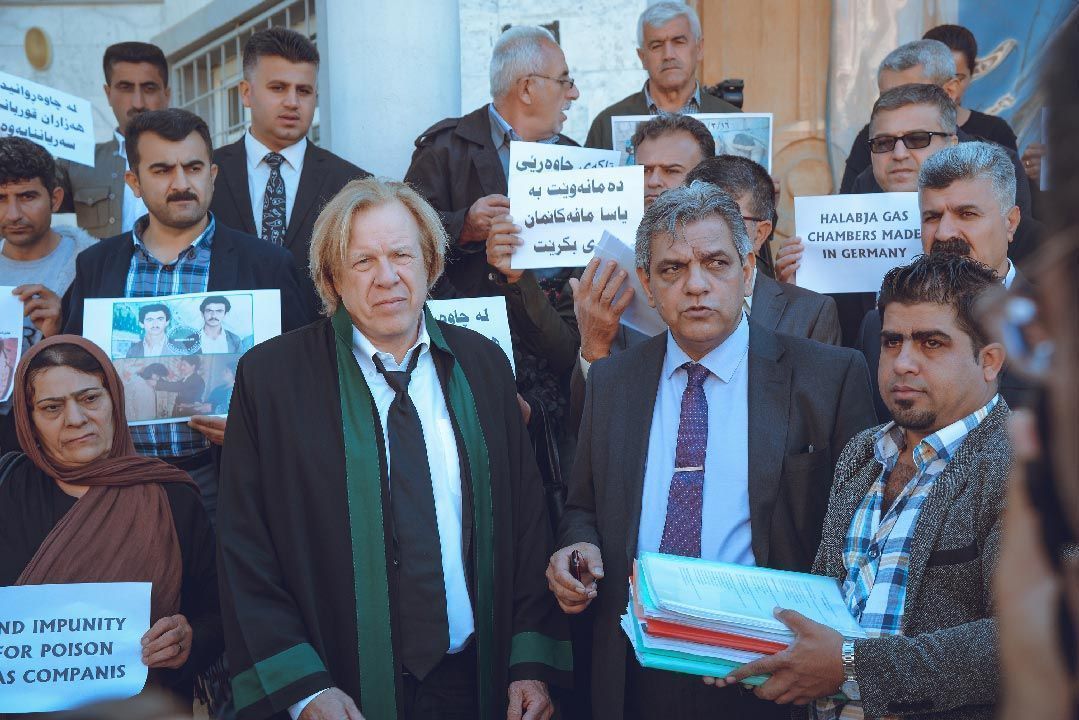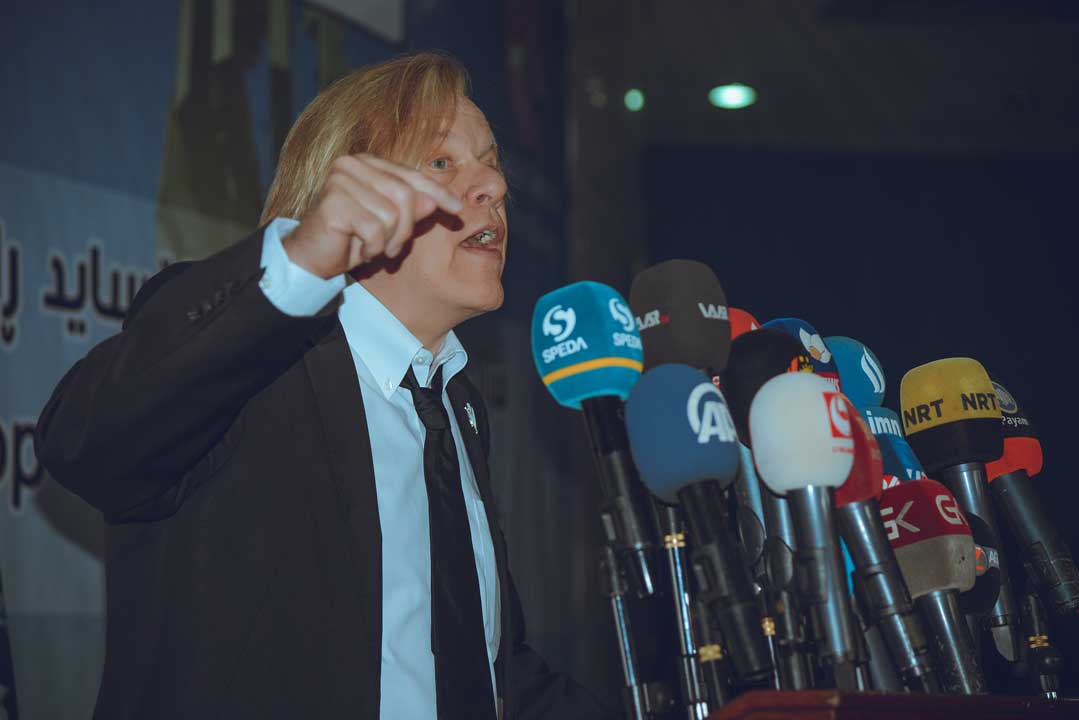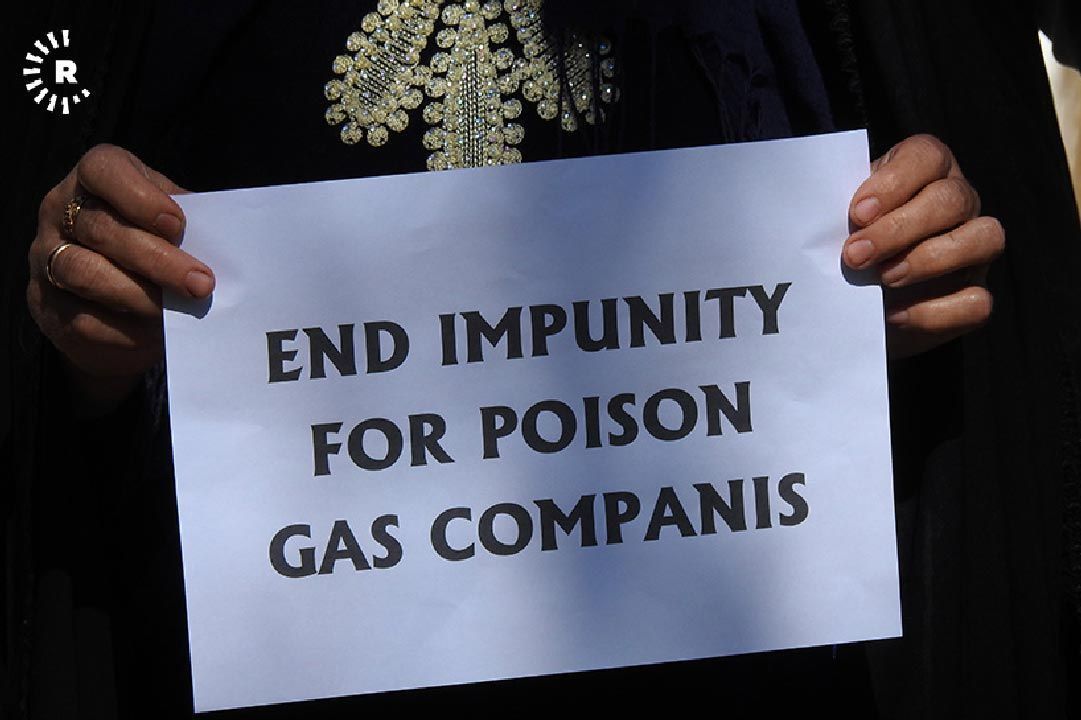March 14, 2018
Kayhan Staff
Thirty years after an unknown number of Iraqi Kurds lost their lives, or were injured when the regime of former President Saddam Hussein carpet bombed the southern Kurdistan city of Halabja with chemical weapons, dozens of survivors and families of victims are suing European companies and financial institutions for alleged collaboration in the genocidal attacks.
The lawsuit, filed Wednesday by American law firm MM-Law, in the Halabja civil court, charges that defendants “allegedly entered a conspiracy with the Saddam regime and profited from assisting and enabling him to carry out a series of chemical weapons attacks that caused 180,000 victims.”
The lawsuit does not explicitly charge that the companies knew Saddam was planning to use chemical attacks against the Kurds, in an operation known as Anfal, only that they helped Saddam operationalize his chemical weapons machinery.
“Recently uncovered evidence shows that the German companies, along with other co-conspirators, knowingly entered into the conspiracy with the Saddam regime and profited from: building the chemical weapons plants and gas chambers required for weapons development in a shape concealing their real purpose, providing chemical weapons precursors, components and equipment, helping the regime to bypass international restrictions meant to limit its chemical weapons program after being confronted with evidence the regime was actively using those illegal weapons,” according to the lawsuit.

While the lawsuit names specific companies, MM-Law says the list can be amended to add new firms. For now, however, MM-Law has named tourism and travel company TUI A.G.; German technical and scientific supplies company Karl Kolb; French company Protec; German industrial company Heberger; chemical processing and services company De Dietrich; and Luxemburg banking institutions Melspring and Kredietbank, as defendants.
“The defendants include two of the largest German companies (TUI A.G and Karl Kolb GmbH & Co.) …. for complicity in genocide. A Luxemburgish private bank (Kredietbank Luxemburg ) will be named for having funded dirty businesses, as well as one major French company (Protec) and other European financial entities that allegedly took part to the conspiracy,” said MM-Law in a press release.

MM-Law says that for the time being, its lawsuit in Halabja includes 9 plaintiffs, which encompasses 79 people. The suit wants the judge to approve compensatory damages of $1 million for each of the 69 wrongful deaths and $7 million for each person injured.
But the firm says the annex to the lawsuit also includes names of thousands of other victims. Depending on how much the judge approves for compensation, and which of those names qualify for compensation, total damages against defendants could eventually reach into billions.
While commonly recognized as an act of genocide, international courts such as the Hague-based International Criminal Court (IC) have not dealt with the Halabja massacre, in part because Iraq is not a signatory to the Rome Statute that established the ICC.
After the fall of Saddam, Iraq established The High Tribunal of Iraq, or the Iraqi Special Tribunal, as a national court to hear cases of crimes committed by the previous regime between 1968 and 2003. Article 10 of the Statute includes “crimes of genocide, crimes against humanity and war crimes that were previously unknown to Iraqi law.”
“Special Law No. 10, which deals specifically with genocide, crimes against humanity and war crimes committed by the Saddam regime, limits application to individuals residing in Iraq, and excludes foreign and domestic corporations. Moreover, Law No. 10 requires all civil and criminal case be brought exclusively in the Tribunal created by the law, and that Tribunal has disbanded,” says MM-Law.
To remedy that, MM-Law is also working with a group of Kurdish parliamentarians to draft a new law for adoption by the Iraqi parliament that would empower all District Courts in Iraq, including the courts in the Kurdish region, to try criminal and civil cases against those complicit in the genocide, crimes against humanity and war crimes. It would also remove limits on liability for foreign individuals and companies. That draft is still far from being adopted, making the planned legislation if it were to become law, unavailable for the current lawsuit filed in Halabja.
“The draft law extends beyond the current law’s limitation for crimes committed by the Ba’ath regime – to all war crimes, genocide and crimes against humanity, including for example, the crimes committed by ISIS. These crimes under international law have no time limitation and the draft law conforms to international law standards,” says MM-Law’s Valentina Cominetti.
It is likely that the lawsuit will be appealed by either side once the judge makes a ruling. In the interim, MM-Law says it is considering multiple strategies to make the companies that helped Saddam, pay for their alleged complicity.
Options, says the law firm, include bringing lawsuits in countries where the companies have major operations, demanding enforcement of the Iraqi decision in countries where the court is recognized to have jurisdiction, and mounting “name and shame” public relations campaigns to hurt the reputations of the companies and impact their profit.
It is not clear if any of the companies named in the lawsuit still operate in Iraq. MM-Law remains tight-lipped on whether it had the cooperation of the Iraqi government on the lawsuit before filing it.










I wish them all the best from the bottom of my heart. I want these merchants of death pay and behind the iron bars. I also wish the Mexicans get their Alamo back from Texas, Khamenei wins a Noble Piece Prize and Trumps to win in 2020. I am sorry you are barking up a wrong tree. They sold the poison. The money is gone,Sadam ls dead, they don’t speak in KURDISH.Let,s all go home and pray to god for their punishment, I WISH